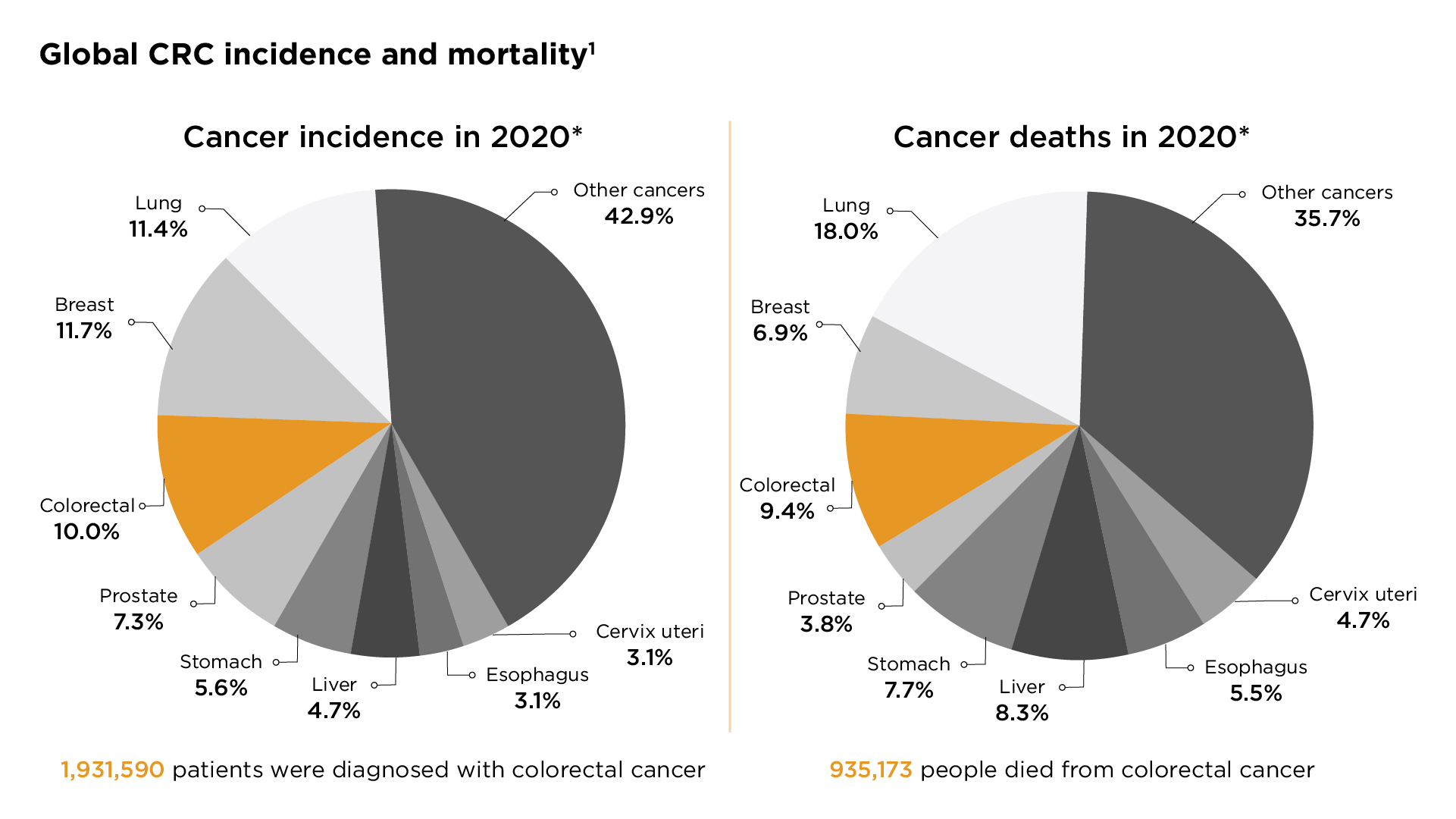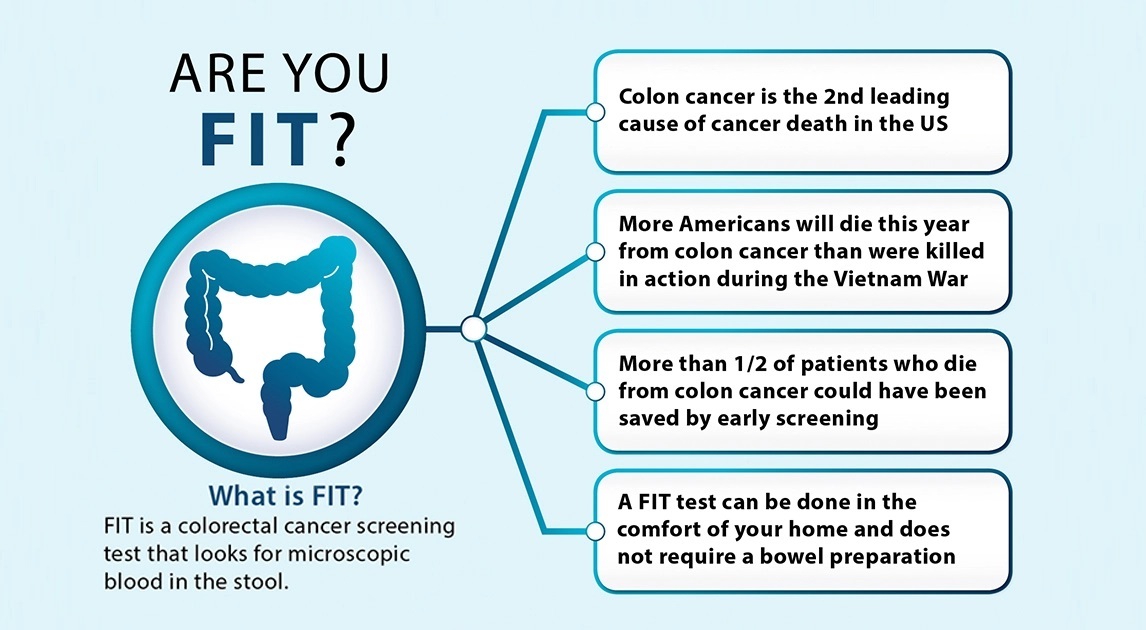Colorectal cancer (CRC) remains a critical global health concern, ranking as the third most common cancer and the second leading cause of cancer-related deaths worldwide (1–3). While CRC is traditionally associated with older populations (4), the rise of early-onset colorectal cancer (EOCRC) has emerged as an alarming trend, particularly in high-income countries (5,6). In sub-Saharan Africa (SSA), CRC ranks as the fifth most common cancer, yet mortality rates are disproportionately high due to limited access to healthcare (7). The established risks of colorectal cancer (CRC) are well-documented; however, the intersection of human immunodeficiency virus (HIV) and CRC presents an emerging area of concern (8). This Insight Article explores colorectal cancer trends, recent advancements in prevention and treatment, and the economic and global strategies required to address this growing challenge.
The Global Burden of Colorectal Cancer
Colorectal cancer accounted for 1.9 million new cases and approximately 0.9 million deaths globally in 2020 (1) and is estimated to rise to 2.2 million new cases and 1.1 million related deaths by 2030(3). The incidence rates vary widely, with high-income countries (HICs) such as the United States, Canada, and countries in Western Europe reporting higher detection rates due to robust screening programs (6). Conversely, SSA and parts of Southeast Asia report lower incidence but higher mortality rates due to late-stage diagnoses and limited access to care (7).
Between 1990 and 2021, the incidence of early-onset colorectal cancer rose globally, with East Asia contributing significantly to this rise, partly due to the westernisation of dietary patterns (9). These regional variations highlight the pressing need for context-specific screening and prevention strategies (1). EOCRC now represents nearly 10% of all CRC cases, with projections indicating a further rise, especially in high-income regions, where up to 25% of rectal cancers could occur in individuals under 50 by 2030 (5).
An alarming trend is the rising incidence of colorectal cancer among young women, with early-onset cases becoming more common (6,10). Challenges in early detection arise due to symptoms often being mistaken for less serious conditions, compounded by barriers such as lack of awareness and high costs. This stresses the importance of understanding risk factors and promoting self-advocacy in healthcare to improve outcomes.
Lifestyle factors, including diets rich in processed foods, obesity, and reduced physical activity, have contributed significantly to CRC’s increasing incidence worldwide (6,9,11). Genetic predispositions, particularly Lynch syndrome, account for a substantial number of EOCRC cases (5). Furthermore, CRC is associated with a considerable economic burden, affecting both healthcare systems and patient productivity (2).

Innovations in Prevention, Diagnosis, and Treatment
Efforts to combat CRC have led to innovations in screening and treatment. For instance, in the United States and Canada, cell-free DNA (cfDNA) blood-based tests, a non-invasive screening method, have been incorporated into national screening guidelines, improving early detection rates among average-risk populations (12). Similarly, Austria has reduced the recommended screening age to 40 for high-risk individuals, while several European countries are piloting multiplex methylated DNA stool tests as a scalable solution in primary care settings (12).
The integration of liquid biopsy into Abu Dhabi’s IFHAS program marks another significant advancement, enhancing early detection through a multi-modal approach without replacing colonoscopy and faecal immunochemical testing (FIT) (13). This initiative is part of a broader trend of adopting innovative, non-invasive methods. In several countries, screening recommendations have been lowered to age 45 for average-risk individuals (9). Non-invasive screening methods, such as FIT and cfDNA blood-based tests, have emerged as accessible and cost-effective alternatives to colonoscopy (7,12,14).
On the treatment front, nanotechnology and targeted therapies are transforming CRC management. The development of functionalised polymeric nanoparticles (PNPs) enhances the precision of drug delivery, notably with agents like Capecitabine (CAP) and Thymoquinone (TQ) (2). Meanwhile, the novel A1 fluorinated CXCR4 inhibitor demonstrates promise by inhibiting tumour proliferation and improving immune responses (16).
Multidrug resistance (MDR) remains a significant obstacle; however, combination therapies—such as 5-fluorouracil with curcumin—are showing potential to overcome this challenge (17). Furthermore, angiogenesis, primarily mediated by Vascular Endothelial Growth Factor (VEGF), plays a crucial role in colorectal cancer progression (18). Current treatments targeting angiogenesis, such as bevacizumab and regorafenib, are effective but face challenges like drug resistance and toxicity.
In addition, regulatory bodies such as the European Medicines Agency (EMA) and Food and Drug Administration (FDA) have approved various immune checkpoint inhibitors (ICIs) for the treatment of Microsatellite Instability-High (MSI-H) metastatic colorectal cancer (mCRC), owing to clinical trials that have demonstrated significant and lasting responses. This real-world data backs the use of ICIs as a first-line therapy for MSI-H mCRC, emphasising their therapeutic value (19).
Comparative Insights and Global Disparities
In HICs, comprehensive CRC screening programs have led to declining incidence rates among older populations, whereas younger age groups continue to see a rise in EOCRC (5,6). Conversely, in Low- and Middle-Income Countries (LMICs), such as countries within SSA, screening access remains limited, contributing to higher mortality rates (7,11).Efforts by organisations such as the World Health Organization (WHO) and the American Cancer Society (ACS) aim to expand CRC screening globally and reduce mortality by 2030 (1,9).
Innovative diagnostic tools such as multiplex methylated DNA testing are improving early detection, particularly in under-screened groups (9). However, disparities persist due to cultural barriers, infrastructural limitations, and health policy gaps (17).While global disparities in CRC management are evident, the impact of comorbid conditions such as HIV further complicates outcomes (8). Recent findings indicate that HIV-infected CRC patients face worse postoperative survival rates compared to their non-HIV counterparts (8). The outcomes of CRC in patients with comorbid conditions, such as HIV, add complexity and highlight the necessity for research-backed, personalised care approaches.
Economic and Financial Considerations
CRC imposes a significant financial burden, driven by late-stage diagnoses requiring intensive care and treatment (1,2). In LMICs, direct healthcare costs are exacerbated by productivity losses and limited access to affordable treatment options (17). Cost-effective innovations such as cfDNA tests and FIT could alleviate financial strain by facilitating early detection (12,14). Advanced therapies, like the A1 inhibitor and PNPs, offer the potential to reduce hospitalisation rates and improve patient outcomes while decreasing healthcare costs (2,16).

Global Efforts and Future Directions
International collaboration is essential to bridging gaps in CRC management. The WHO’s goal to achieve widespread CRC screening coverage by 2030 is a pivotal step towards reducing global mortality rates (9). Strategic investments into healthcare infrastructure, education, and equitable access to innovative diagnostics and therapies are critical for achieving these targets (16). Efforts to integrate culturally sensitive education campaigns alongside innovative technologies—such as cfDNA testing—are central to improving CRC outcomes, particularly in LMICs (7,12).
Conclusion
Colorectal cancer trends emphasise a shifting global health landscape, characterised by the rise of EOCRC and persistent disparities in screening and treatment access. The increasing incidence of CRC among younger populations highlights the urgent need for earlier and more effective screening programs, particularly in high-income countries. Concurrently, low- and middle-income countries continue to grapple with late-stage diagnoses due to infrastructural and economic barriers.
Innovations such as non-invasive diagnostic tools, advanced therapeutics, and targeted education campaigns are starting to bridge these gaps, but widespread implementation remains limited. The role of angiogenesis, through mediators like VEGF, and emerging treatments such as ICIs, particularly for MSI-H tumors, are promising but emphasise the complexity of developing targeted interventions.
Globally, collaborative efforts—driven by organisations like the WHO and the ACS—are crucial to scaling up preventive measures and ensuring equitable access to life-saving interventions. Ultimately, advancing CRC care will require multi-sectoral investment and policy reforms that bolster healthcare systems and improve patient outcomes worldwide. As the 2030 targets approach, coordinated action between governments, healthcare providers, and international organisations will be vital to reducing CRC mortality and advancing public health. Addressing factors such as drug resistance and the need for innovative treatment strategies will remain integral to these efforts.
References
- Roshandel G, Ghasemi-Kebria F, Malekzadeh R. Colorectal Cancer: Epidemiology, Risk Factors, and Prevention. Cancers. 2024 Apr 17;16(8):1530.
- Raikar PR. An innovative synergistic combination using eudragit-coated galactosylated PLGA-pluronic nanoparticles for addressing colorectal cancer. Journal of Drug Delivery Science and Technology. 2024;
- Ingelheim B. InOncology | Oncology Investigation, Research and Treatment Options. 2021 [cited 2025 Mar 17]. Colorectal Cancer in focus | InOncology – Boehringer Ingelheim. Available from: https://pro.boehringer-ingelheim.com/inoncology/tumor-types/CRC
- Gümüş MB. Healthcare for Older Adults in Türkiye: A Call for Reform [Internet]. Syenza News. 2024 [cited 2025 Mar 17]. Available from: https://news.syenza.com/addressing-healthcare-challenges-for-older-adults-turkey/
- Sinicrope FA. Increasing Incidence of Early-Onset Colorectal Cancer. Longo DL, editor. N Engl J Med. 2022 Apr 21;386(16):1547–58.
- Spaander MCW, Zauber AG, Syngal S, Blaser MJ, Sung JJ, You YN, et al. Young-onset colorectal cancer. Nat Rev Dis Primers. 2023 Apr 27;9(1):21.
- Amer A, Boutall A, Coetzee E, Naidu P, Moodley H, Chen W, et al. Epidemiology and anatomic distribution of colorectal cancer in South Africa. South African Journal of Surgery. 2024 Dec;62(4):333–7.
- Lubbe C. HIV Colorectal Cancer Survival [Internet]. Syenza News. 2025 [cited 2025 Mar 31]. Available from: https://news.syenza.com/hiv-colorectal-cancer-survival-tailored-strategies/
- Meng Y, Tan Z, Zhen J, Xiao D, Cai L, Dong W, et al. Global, regional, and national burden of early-onset colorectal cancer from 1990 to 2021: a systematic analysis based on the global burden of disease study 2021. BMC Medicine. 2025 Jan 21;23(1):34.
- Colorectal Cancer Is On The Rise In Young Women [Internet]. [cited 2025 Mar 31]. Available from: https://www.bustle.com/wellness/colorectal-cancer-is-on-the-rise-in-young-women-heres-what-you-need-to-know
- Gümüş MB. GCC Healthcare Concerns: Key Challenges and Solutions for Residents [Internet]. Syenza News. 2024 [cited 2025 Mar 17]. Available from: https://news.syenza.com/gcc-healthcare-concerns-key-challenges-solutions-residents/
- Chung DC, Gray DM, Singh H, Issaka RB, Raymond VM, Eagle C, et al. A Cell-free DNA Blood-Based Test for Colorectal Cancer Screening. N Engl J Med. 2024 Mar 14;390(11):973–83.
- Carapinha JL. Liquid Biopsy Colorectal Cancer Screening Expands in Abu Dhabi [Internet]. Syenza News. 2025 [cited 2025 Mar 31]. Available from: https://news.syenza.com/liquid-biopsy-colorectal-cancer-screening-abu-dhabi/
- Carapinha JL. Deadline Boosts Colorectal Cancer Screening Uptake in TEMPO Trial [Internet]. Syenza News. 2025 [cited 2025 Mar 17]. Available from: https://news.syenza.com/deadline-boosts-colorectal-cancer-screening-uptake-tempo-trial/
- Carapinha JL. Enhancing Colorectal Cancer Screening Through Mail and Navigation Strategies [Internet]. Syenza News. 2025 [cited 2025 Mar 31]. Available from: https://news.syenza.com/enhancing-colorectal-cancer-screening-rural-medicaid/
- Khorramdelazad H, Bagherzadeh K, Rahimi A, Darehkordi A, Najafi A, Karimi M, et al. A1, an innovative fluorinated CXCR4 inhibitor, redefines the therapeutic landscape in colorectal cancer. Cancer Cell Int. 2025 Jan 5;25(1):5.
- Ashique S, Bhowmick M, Pal R, Khatoon H, Kumar P, Sharma H, et al. Multi drug resistance in Colorectal Cancer- approaches to overcome, advancements and future success. Advances in Cancer Biology – Metastasis. 2024 Jul;10:100114.
- Lubbe C. Molecular Insights into Angiogenesis in Colorectal Cancer [Internet]. Syenza News. 2025 [cited 2025 Mar 31]. Available from: https://news.syenza.com/molecular-insights-angiogenesis-colorectal-cancer/
- Carapinha JL. Survival Benefits of Immune Checkpoint Inhibitors in Metastatic Colorectal Cancer [Internet]. Syenza News. 2025 [cited 2025 Mar 31]. Available from: https://news.syenza.com/survival-benefits-immune-checkpoint-inhibitors-metastatic-colorectal-cancer/
- Veterans Health Administration [Internet]. [cited 2025 Mar 17]. Colorectal cancer screening is very important. Available from: https://content.govdelivery.com/accounts/USVHA/bulletins/335eba8
Table of Contents

